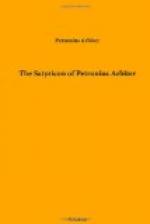Those who object, that things of this nature ought not to he translated, must arraign the versions of Juvenal Suetonius, etc., but what Suetonius thought excusable in History, any sober man will think much more allowable in Satyr: Nor can this be offensive to good-manners, since the gross part here is the displaying of vices of that dye, that there’s an abhorrence even in nature from ’em; nor is it possible that any ill man can talk a good one into a new frame or composition; nay, perhaps it may be applicable to a good use, to see our own happiness, that we know that to be opposite to humanity it self, which some of the ancients were deluded even to practise as wit and gallantry, thus I’m so far from being toucht in expressing those crimes, that I think it makes the more for me, the more they’re detested.
If I have alter’d or added to the author, it was either to render those customs of the Romans that were analogous to ours, by what was more familiar to us, or to prevent a note by enlarging on others where I found ’em.
The verse of both parts are mine, and I have taken a great liberty in ‘em; and tho’ I believe there I have not wrong’d the original, yet all will not amount to call them good.
The money at first I made English coin, but not the exact worth, because it would have been odd in some places to have brought in pence and farthings; as when the thousand sesterces are offered for Gito, it would not be consistent with the haste they were in to offer so many pounds, so many shillings, and so many pence: I therefore proportioned a sum to the story without casting up the sesterces; thus they went to the press: But advis’d either to give the just value or the Roman coin, I resolv’d on the latter for the reasons I have given, and alter’d the summs as the proofs came to my hands; but trusting the care of one sheet to a friend, the summ of 2000 crowns past unalter’d.
W. B.
THE SATYRICON OF PETRONIUS
THE SATYR OF
TITUS PETRONIUS ARBITER
With its Fragments, recover’d at Buda, 1688.
PART ONE
“I promis’d you an account of what befel me, and am now resolv’d to be as good as my word, being so met to our desires; not only to improve our learning, but to be merry, and put life in our discourse with pleasanter tales.
“Fabricius Vejento has already, and that wittily, handled the juggle of religion, and withal discover’d with what impudence and ignorance priests pretend to be inspir’d: But are not our wrangling pleaders possest with the same frenzy? who cant it? These wounds I receiv’d in defence of your liberty; this eye was lost in your service; lend me a hand to hand me to my children, for my faltering hams are not able to support me.




